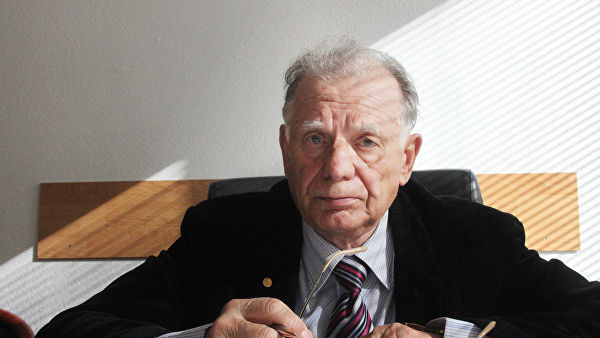Žores Alfjorov (15.3. 1930 - 1.3.2019) oli kvanttiyysikko, jonka tukimustulokset ja keksinnöt ovat löytäneetsovellutuksia niin tietoliikennetekniikasta kuin rakennutekniikastakin -ja siltä väliltä.
Hänet tunnetaan todellisena ja päättäväisenä tieteen ideologisena ja poliitisena puolustajana niin esimerkiksi uskontoa kuin valemarkkinamekanimiakin vastaan, jotka tuhoavat tieteen.
Hän valmistui Leningradin Säkhköteknisestä instituutista 1952 ja ryhtyi toimimaan NL:n Tiedeakatemian Fysioteknisen instituutin palveluksessa, jossa vaikutti koko työikänsä. Vuonna 1972 hän sai NL:n akateemikon arvon kirjeenvaihtajajäsenenä ja vuonna 1979 täysjäsenenä. Hän oli vuodesta 1989 vuoten 2017 Tiedeakatemian varapuheenjohtaja ja sen Leningradin osaston puheenjohtaja.
Vuonna 1965 hän liittyi NL:n kommunistiseen puolueeseen, josta kuitenkin Gorban aikana vieraantui ja toimisettemmin Kotimme on Venäjä -porvaripuolueessa, josta valittiin 1995 myös kansanedustajaksi duumaan, mutta vuoden 1999 vaaleissa hän palasi Kommunistien riveihin ja valittiin puolueen toiseksi suurimmalla äänimäärällä Duumaan.
Hän vastusti presidentti Putinin akatemiauudistusta.

https://fi.wikipedia.org/wiki/%C5%BDores_Alfjorov
-
Žores Ivanovitš Alfjorov (ven. Жорес Иванович Алфёров, 15. maaliskuuta 1930 – 1. maaliskuuta 2019[1]) oli venäläinen fyysikko, joka sai vuonna 2000 Nobelin fysiikanpalkinnon yhdessä Herbert Kroemerin ja Jack Kilbyn kanssa työstään puolijohdekomponenttien, erityisesti nopeiden transistorien, laserdiodien ja integroitujen mikropiirien kehittelystä. Näihin komponentteihin voidaan sanoa perustuvan nykyisen informaatioteknologian.
Alfjorov on Oulun yliopiston kunniatohtori. Hän on vieraillut Oulun yliopistossa useita kertoja 1980-luvulta alkaen. [2]
Poliittinen toiminta
Alfjorov valittiin 1995 Venäjän duumaan Jeltsiniä tukeneen Kotimme on Venäjä -puolueen ehdokkaana. Vuodesta 1999 lähtien hän on ollut duumassa kommunistien ehdokkaana. Hänet valittiin uudelleen 2003 ja 2007. Vuonna 2007 hän oli kommunistien listan kakkosehdokkaana vain puoluejohtaja Gennadi Zjuganovin jälkeen ja ennen Nikolai Haritonovia. Valtioduuman vanhimpana jäsenenä hän oli väliaikainen puhemies viidennen duuman kokoontuessa.
Alfjorov oli mukana kesällä 2007 mukana kymmenen Venäjän tiedeakatemian jäsenen allekirjoittamassa avoimessa kirjeessä presidentti Vladimir Putinille, jossa he arvostelivat häntä kirkon "soluttautumisesta" valtion elimiin, koulutukseen ja tieteeseen.[3]
Lähteet
- Умер Жорес Алферов (venäjäksi)
- ee.oulu.fi
- Open letter to the President of the Russian Federation Vladimir V. Putin from the Members of the Russian Academy of Sciences scepsis.ru. , alun perin Kentavr, No. 3, pp. 1-2
Akateemikko Alfjorovista löytyy hakusana jo vuoden 1979 Sovjetskaja entsiklopedijasta, joka on uutena jenkkikäännöksenä netissä:
Alferov, Zhores Ivanovich
Born Mar. 15, 1930, in Vitebsk. Soviet physicist. Corresponding member of the Academy of Sciences of the USSR (1972). Member of the CPSU since 1965.
Upon graduating from the Leningrad Electrical Engineering Institute in 1952, Alferov joined the staff of the Physicotechnical Institute of the Academy of Sciences of the USSR, where he still holds a position. He was named a professor at the Leningrad Electrical Engineering Institute in 1972.
Alferov’s principal works have dealt with the study of hetero-junctions in semiconductors and with the development of hetero-junction devices. He discovered the phenomenon of “superinjection” in heterostructures and advanced a theory for the use of heterostructures in semiconductor electronics.
Alferov received the Lenin Prize in 1972 and has been awarded two orders and various medals.
МОСКВА, 2 мар — РИА Новости.
Нобелевский лауреат, академик Жорес Алферов скончался в Санкт-Петербурге, сообщила РИА Новости его супруга Тамара.
Ему было 88 лет.
Причиной смерти Алферова стала острая сердечно-легочная недостаточность, рассказали РИА Новости в Санкт-Петербургском национальном исследовательском академическом университете РАН. Дата и место прощания с ученым пока не определены, сейчас семья решает этот вопрос, добавил собеседник агентства.
В конце ноября Алферов попал в больницу после того, как ему стало плохо на заседании РАН. Первоначально сообщалось об инсульте, однако затем в Академии наук пояснили, что это был гипертонический криз.
Жорес Алферов родился 15 марта 1930 года в Витебске. Окончил факультет электронной техники Ленинградского электротехнического института, с 1953 года работал в Физико-техническом институте имени Иоффе.
Занимался разработкой полупроводниковых гетероструктур и созданием быстрых опто- и микроэлектронных компонентов. За это в 2000 году его удостоили Нобелевской премии по физике (вместе с американцами Джеком Килби и Гербертом Кремером).
В 1991-2017 годах Алферов был вице-президентом РАН.
https://www.pirkanblogit.fi/2017/risto_koivula/venajan-kommunistien-arvostelua-putinia-kohtaan/
***
Puun uudet ominaisuudet voivat mullistaa puurakentamisen Suomessa – nanopinnoitteiden avulla syntyy palamatonta puuta ja kevyttä betonia
Hiilinanopartikkelin rakenne muistuttaa munkkirinkilää. Pietarin polyteknillinen yliopisto
https://yle.fi/uutiset/3-10689278
Puun uudet ominaisuudet voivat mullistaa puurakentamisen Suomessa – nanopinnoitteiden avulla syntyy palamatonta puuta ja kevyttä betonia
Palamatonta puuta voidaan käyttää esimerkiksi rakennusten pintamateriaalina. Se toisi merkittävän parannuksen paloturvallisuuteen.
Yliopistotutkijat kehittävät puuta, jota on käytännössä mahdoton saada syttymään. Tavoitteena on käsitellä puuta niin, että sille saataisiin rakennusmateriaalien vaativin paloluokitus A tai B. Sellaisia ovat tällä hetkellä muun muassa vuorivilla tai lasi.
Palamattomalle puulle on paljon käyttökohteita. Sitä voitaisiin käyttää nykyistä enemmän vaikkapa julkisten tilojen pintamateriaalina.
– Voimme parantaa palonkestoa, ja tälle ominaisuudelle on puukerrosrakentamisessa kova tarve, sanoo professori Timo Kärki Lappeenrannan–Lahden teknillisestä yliopistosta.
Palamaton puu osa isompaa tutkimusta, jota tekevät yhdessä Lappeenrannan–Lahden teknillinen yliopisto ja Pietarin polyteknillinen yliopisto. Tutkijat kehittävät nanorakenteiden avulla tutuista rakennusmateriaaleista aiempaa kestävämpiä ja kevyempiä tuotteita.
– Perustana on nanohiili, josta valmistettua pintakäsittelyainetta sivellään esimerkiksi puuhun, sanoo professori Timo Kärki.
Nanopinnoite pohjautuu venäläisen fyysikon Zores Alfjorovin ja tutkijoiden löytämästä nanorakenteesta, joka muistuttaa munkkirinkilää. Yleensä nanorakenteet ovat pitkulaisia ja putkimaisia – tai jalkapallon muotoisia.
Erikoinen rinkilämäinen rakenne tuo ainutlaatuisia lisäominaisuuksia esimerkiksi betoniin.
... Nanohiilen poikkeuksellinen rakenne tuo lujuuden
Nanohiilen valmistusprosessi on patentoitu, mutta Pietarin ja Lappeenrannnan–Lahden teknilliset yliopistot kehittävät sille kaupallista käyttöä ja markkinoita EU-alueella.
– Teemme tuotehyväksyntään liittyviä mittauksia puupuoleen liittyvissä hankkeissa. Vastaavia on venäläinen kumppani tehnyt betonin osalta, sanoo professori Timo Kärki.
Nanorakenteen löytäjä fyysikko Zores Alfjorov tunnettiin elinaikanaan paremmin työstään nykyisen informaatioteknologian kehittäjänä. Siitä hän sai Nobelin fysiikanpalkinnon vuonna 2000.
Alfjorov ehti käydä luennoimassa työstään Lappeenrannassa järjestetyssä EU-Venäjä-innovaatiofoorumissa vuonna 2012. Alfjorov menehtyi (siirryt toiseen palveluun) 88-vuotiaana Pietarissa maaliskuussa 2019.
Kommentit